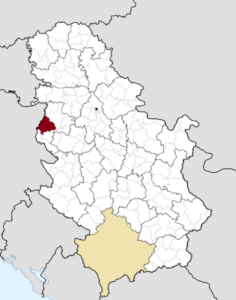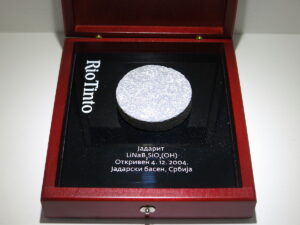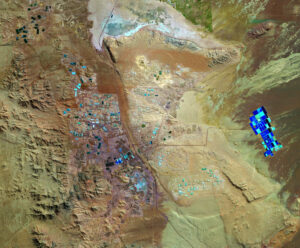Minds of the Movement
An ICNC blog on the people and power of civil resistance
by Sonja StojadinovicFebruary 09, 2022
For the last few months, people in the western part of Serbia near the city of Loznica have been struggling to preserve their homes and livelihoods from the invasion of lithium mining investors. This region is rich in jadarite ore from which much-demanded lithium metal is extracted (used in nearly all technology).
But the extraction procedure itself would not come without consequences for the environment and the local population. As a country very rich in water sources and minerals, Serbia has for a long time been a target of international mining and of multinational corporations that do not implement environmental protection in their work for the sake of making a profit. And as a former socialist country, Serbia has developed a dirty industry, air pollution, and a heavy carbon footprint from coal-powered plants. Recent government complicity with the mining company Rio Tinto has compounded the grievances of those Serbian people who are concerned for the environment. They quickly realized that they would not be able to rely on institutional action to halt the momentum for lithium mining.
Therefore, they are hitting the streets—or rather blocking the streets—with promising victories thus far.
Grievances and government reactions

The city of Loznica in western Serbia. Credit: Wikipedia.
Lithium extraction in the Loznica area is not a completely new project. In 2017, the previous Serbian government signed an agreement with the British-Australian mining giant Rio Tinto, but research and analyses of the soil started as early as 2004. Now, with the mining imminent, people in Loznica and several other cities have loudly raised their voices against it.

Jadarite at the Natural History Center of Serbia in Svilajnac. Credit: Dungodung/Wikipedia.
Their grievances are many, but the biggest one is the mass pollution that surface mining of lithium would cause. The extraction technology includes chemicals that would pollute the soil, air and water for people living near the mining location and the generations after. The process of extraction itself would be located on the surface of the mine, which directly contributes to soil and air pollution. The process also requires massive water usage, which leads directly to pollution of underground wells. Moreover, Rio Tinto is globally known for its disregard for environmental protection laws of the countries where they mine. Numerous cases of pollution and local disease have been documented in association with their mines.
In order to speed up the launch of lithium extraction, the Serbian government in November 2021 tried to push through parliament a bill according to which the steps for expropriation of a private property could be realized in only five days (instead of the previous 3-6 years) if the government decides that it is of public interest. The government is also using measures to complicate the possibility of calling a referendum on lithium mining.
Initial tactics and challenges
Early last December, massive road blockages and protests erupted in 50 different locations across the country, organized mostly via social media. In the capital city of Belgrade thousands of people blocked crucial city arteries for several hours and caused a total collapse of the transport system. The blockades lasted for several hours over the course of several days, so the impact was continuous. President Aleksandar Vucic’s government was not indifferent to this nonviolent action and several physical clashes were documented between protesters and violent provocateurs sent by the government. The main provocateurs were football (soccer) hooligans of the “Crvena zvezda” (Red star) and “Partizan” (Partisan) clubs from Belgrade, who are known for their violent behavior in and outside of football arenas. The government used this tactic to distance itself from the clashes; the football hooligans were effectively sent to do the government’s dirty work.
Protesters are currently running an internet and television campaign against lithium mining investment to awaken public awareness of the potential damage that mining would cause. And not just for people in the region concerned—once mining is allowed to go forward in one area, it sets a precedent, with potential consequences for people in other parts of the country.
Movement victories

River Drina near Loznica. Credit: Wikipedia/Ivana Trivkovic.
On December 16, 2021, the city council of Loznica withdrew a plan that included the implementation of the mining project. Then, on January 20, 2022, the Serbian Prime Minister announced that the country was withdrawing the plan and revoking licenses related to Rio Tinto's proposed Jadar lithium-borates project.
Still, the nonviolent protests must continue, and will continue. The activists know that these moves were very much politically motivated, not authentic commitments to meeting movement demands. The union of ecological organizations has called for nonviolent protests again if President Vucic rejects their demand to present proof that there will be no lithium mining in Serbia. However, the protest will lose momentum if the union does not continue to include the residents of Loznica. This is important as environmental struggles are meaningless without representation of local populations that are/will be impacted.
A “green” future: Clashes between Global North priorities and Global South needs

Tarapacá Region, in northern Chile, an area where lithium as well as other resources are mined. Chile, along with Bolivia and Argentina provide three-quarters of the world's lithium supply. Credit: European Space Agency (CC BY-SA 2.0, unedited).
Green and carbon-neutral policies raise demand for lithium batteries at the global level. These policies do not come without a price tag. They are causing environmental damage and putting at risk the health of people who live near lithium mines. Is green energy, as it is currently conceived, really the future when it is causing poor quality of life, illness, displacement and even death in countries of extraction… which are almost always in the Global South?
Rio Tinto is extracting lithium in Chile, and rich lithium ore is also located in Bolivia and Argentina. Together, these three countries provide 75% of the world’s lithium supply. The people who live in these countries and also in Serbia do not have the same access to electrical vehicles and electrical infrastructure for maintaining car batteries as Western countries. Also, our governments do not offer subsidies for buying hybrid or electrical vehicles for low- or middle-class populations. People in the Global South still drive cars that use diesel fuel and continue to pollute the air, even though they are the ones with the jadarite mines. It’s the new-age Resource Curse.
This dilemma between Global North priorities and Global South poses a question: As noble as “green” policies are in their intent, are they working for a better future for all of us, or just for the ones who can pay?
Until we find the answer, the people of Serbia will continue to block streets and march to protect their health and livelihood.

Sonja Stojadinovic
Sonja Stojadinovic is an MA student in Southeast European Studies at the University of Graz, Austria. She holds bachelor and master degrees in political science and international relations, both obtained on the Faculty of Law, Skopje, University of St. Cyril and Methodius, Republic of North Macedonia. She is also an activist and well-known columnist for North Macedonian daily newspapers and regional political web sites.
Read More